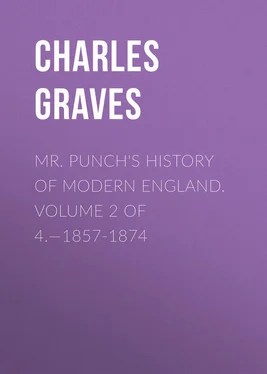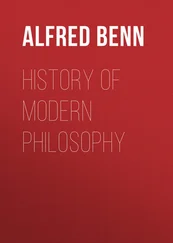Charles Graves - Mr. Punch's History of Modern England. Volume 2 of 4.—1857-1874
Здесь есть возможность читать онлайн «Charles Graves - Mr. Punch's History of Modern England. Volume 2 of 4.—1857-1874» — ознакомительный отрывок электронной книги совершенно бесплатно, а после прочтения отрывка купить полную версию. В некоторых случаях можно слушать аудио, скачать через торрент в формате fb2 и присутствует краткое содержание. ISBN: , Издательство: Иностранный паблик, Жанр: foreign_prose, foreign_humor, на английском языке. Описание произведения, (предисловие) а так же отзывы посетителей доступны на портале библиотеки ЛибКат.
- Название:Mr. Punch's History of Modern England. Volume 2 of 4.—1857-1874
- Автор:
- Издательство:Иностранный паблик
- Жанр:
- Год:неизвестен
- ISBN:http://www.gutenberg.org/ebooks/45003
- Рейтинг книги:4 / 5. Голосов: 1
-
Избранное:Добавить в избранное
- Отзывы:
-
Ваша оценка:
- 80
- 1
- 2
- 3
- 4
- 5
Mr. Punch's History of Modern England. Volume 2 of 4.—1857-1874: краткое содержание, описание и аннотация
Предлагаем к чтению аннотацию, описание, краткое содержание или предисловие (зависит от того, что написал сам автор книги «Mr. Punch's History of Modern England. Volume 2 of 4.—1857-1874»). Если вы не нашли необходимую информацию о книге — напишите в комментариях, мы постараемся отыскать её.
Mr. Punch's History of Modern England. Volume 2 of 4.—1857-1874 — читать онлайн ознакомительный отрывок
Ниже представлен текст книги, разбитый по страницам. Система сохранения места последней прочитанной страницы, позволяет с удобством читать онлайн бесплатно книгу «Mr. Punch's History of Modern England. Volume 2 of 4.—1857-1874», без необходимости каждый раз заново искать на чём Вы остановились. Поставьте закладку, и сможете в любой момент перейти на страницу, на которой закончили чтение.
Интервал:
Закладка:
She waits in arms; and in her cause is safe
Not fearing war, yet hoping peace the end,
Nor heeding those her mood who'd check or chafe,
The Right she seeks; the Right God will defend!
At home Reform had been indefinitely postponed; Lord John Russell had gone to the Lords with an earldom, and Punch , lamenting the cooling of his reforming zeal, recalls the analogies of Chatham, Pulteney, and Holland, who, "to put on earl's ermine laid down their earlier fames." Reorganization of the Navy and a large increase in the number of ships were promised and taken in hand, and Punch records his inspection of a training ship at "Sherrysmouth" and the favourable impression created by the discipline and spirit of all on board. Germany's desire for a fleet is noted and treated with consistent ridicule. As an instance of her activity "it is reported on the very best authority (not less than that of Messrs. Searle, the great boat-builders of Lambeth) that a four-oared cutter will be launched in a very few days." That was in September, 1861, and three weeks later Punch appears in a cartoon as an old salt, handing a toy yacht to a small but plethoric German with the remark: "There's a ship for you, my little man; now cut away, and don't get in a mess." This is followed up with a set of verses ending: —
The moral, my dears, we all understand,
All fat little Germans will stick upon land.
The Suez Canal
Nor was Punch happier in his comments on the Suez Canal. In the "Essence of Parliament" for May 6, 1861, he writes: —
The Lords had a discussion about the Canal of the Future, that is to say, the impossible trench which M. Lesseps pretends to think he can cut through the Isthmus of Suez. The Government opinion upon the subject is, that if the Canal could be made, we ought not, for political reasons, to allow it, but that inasmuch as the Canal cannot be cut, the subject may, and the wise course is to let the speculators ruin themselves and diddle the Pacha. This seems straightforward and benevolent enough.
In Italy Victor Emmanuel had been declared King by the new Parliament, but Punch was not at all certain of the stability of his throne. Cavour died on June 6, but the death of the greatest of Italian statesmen is passed over with a brief though sympathetic reference. In August we find Punch uttering a serious warning to Victor Emmanuel, on the ground that he had sold the cradle of his race, and expressing the fear that Sardinia would be ceded to France as well as Savoy. This was the year in which the crown of Greece was offered to Prince Alfred (the late Duke of Edinburgh). Punch declined it both for him and his next brother, Prince Arthur (the Duke of Connaught). "Let the present King (Otho) mind his own business better," Punch advises. The Greek Crown, it is derisively added, was not worth five bob. The offer, however, was not definitely and officially refused until the following year.
The Trent affair was settled, but throughout 1862 Punch exchanged his impartial unfriendliness to both antagonists for a distinct bias against the North and Lincoln. For the moment his distrust of Louis Napoleon was merged in disapproval of the Empress Eugénie for her alleged interference in politics and support of the Papal pretensions. The visit of the Japanese ambassadors in the summer inspired imaginary dispatches, in which allusion is made to their interest in English arsenals and factories. Punch , by this time, had at any rate learned not to depict them as negroes, as he had done only a few years earlier. The police-ridden condition of Poland excites his indignation; but he is careful to disclaim sympathy with sentimental "National" movements, maintaining much the same view as that expressed in his lines on "The Nonsense of the Nationalities" three years before: —
No more talk of national races,
Panslavic, Hellenic, all stuff!
Of rant, gestures wild, and grimaces
On that point, we've had quite enough.
John Bull you will vainly appeal to,
That in his own person contains
Both Saxon and Norman; a deal, too,
Of Danish blood runs in his veins.
'Coon: "Air you in arnest, Colonel?"
Colonel Bull: "I am."
'Coon: "Don't fire – I'll come down."
The cultivation of the Welsh vernacular provoked Punch's outspoken hostility, as we notice elsewhere. And it is impossible to avoid the conclusion that Punch's strong sympathy with Poland in 1863 was in part due to the fact that Russia, her oppressor, was the only Continental nation friendly to the North in the American war. The exploits of the Alabama only tended to enhance English sympathy with the South, and Mrs. Beecher Stowe's letter, in which she complained that England was throwing her weight into the scale on the slave-owners' side, was not favourably received; while Punch considered it "bad form" for Americans in London to celebrate Independence Day. It is almost needless to say that Louis Napoleon's suggestion for a Congress at Paris was treated with scant courtesy: any suggestion from that quarter was sure to be regarded as suspect.
But the eyes of England and of Europe were diverted from the great struggle in America, already at its height, by events nearer home. The Fenian trouble had already begun in Ireland in 1863; the Schleswig-Holstein controversy was working steadily up to the arbitrament of war. It was of this "question" that Palmerston said that only three men in Europe ever understood it, of whom one (the Prince Consort) was dead; another (a Danish statesman) was mad, and the third (he himself) had forgotten it. Palmerston was inclined to be "interventionist," but was restrained by his colleagues and the influence of the Queen. Punch somewhat reluctantly acquiesced in the view that non-intervention in foreign disputes was the best policy, but his comments with pen and pencil reflect the extreme unpopularity of Prussia. In May appeared the cartoon in which Punch is shown presenting Prussia with the Order of "St. Gibbet." In the same month he bitterly protested against the bestowal of the Order of the Black Eagle on Prince Alfred by the King of Prussia: —
Black Eagle, murder's proper meed!
Well doth its colour match the stain
Of guilt, that dyes that coward's deed
Who female slew and infant Dane,
Black Eagles are for blackguards right,
White feather who with black combine.
No English Prince shall be a Knight
Of such black Chivalry as thine.
The proclamation of General Falkenstein, commander-in-chief of the Prussian troops in Jutland, regulating the scale of contributions to be levied on Danish landlords, is quoted in the issue of June 4 as a villainous edict, worthy of cut-throats and felons. Earlier in the year Punch had fallen heavily on Professor Max-Müller for his letter, "A German Plea for Germans," in The Times . The Prussians and Austrians were depicted, accurately enough in view of the sequel, as bandits quarrelling over their spoil, and this free criticism was bitterly resented throughout Germany. When Müller was tried and executed for the murder of Mr. Briggs in the autumn of this year, the judge was accused of anti-Prussian bias. Meanwhile Punch found little worthy of comment in the American war beyond the allegations of malingering among Federal troops, and the report that Irishmen were induced to emigrate, with promises of help, in order to furnish recruits for the Northern army.
The end of the American war came in 1865. Of its magnitude and of the deeper issues involved; of the achievements of the heroes on either side – Sherman and Grant and Farragut, Stonewall Jackson and Lee — Punch showed himself strangely deficient in appreciation. The amende to Lincoln was handsome and complete, but it was not made until after the assassination of the greatest of Americans: —
Читать дальшеИнтервал:
Закладка:
Похожие книги на «Mr. Punch's History of Modern England. Volume 2 of 4.—1857-1874»
Представляем Вашему вниманию похожие книги на «Mr. Punch's History of Modern England. Volume 2 of 4.—1857-1874» списком для выбора. Мы отобрали схожую по названию и смыслу литературу в надежде предоставить читателям больше вариантов отыскать новые, интересные, ещё непрочитанные произведения.
Обсуждение, отзывы о книге «Mr. Punch's History of Modern England. Volume 2 of 4.—1857-1874» и просто собственные мнения читателей. Оставьте ваши комментарии, напишите, что Вы думаете о произведении, его смысле или главных героях. Укажите что конкретно понравилось, а что нет, и почему Вы так считаете.












